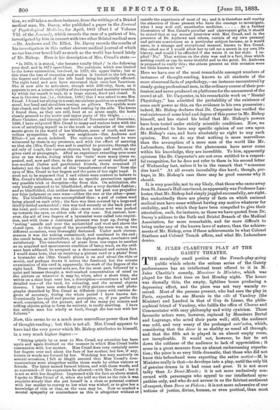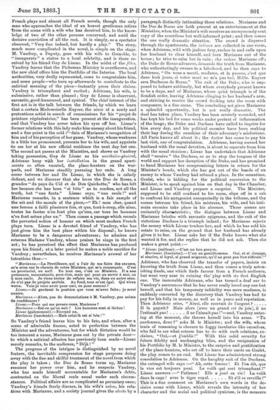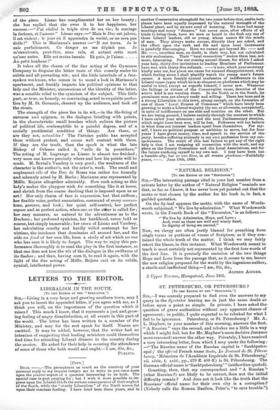M. JULES CL &RETIE'S PLAY AT THE GAIETY THEATRE.
THE seemingly small portion of the French-play-going _ public which selects the serious series of the Gaiety performances has an intellectual treat offered to it in M. Jules Clar6tie's comedy, Monsieur is Ministrc, which was played for the first time on last Monday night. The house was dismally thin, the empty, lightless boxes producing a depressing effect, and the piece was not very warmly re- ceived. Most of the persons present, who had seen the play in Paris, expected to see Marais in the role of Vandrey (the Minister) and Landrol in that of Guy de Lissac, the philo- sophical friend of Vaudrey, who fulfils the office of Chorus and Commentator with easy philosophy and witty cynicism. Those favourite actors were, however, replaced by Messieurs Bertal and Lagrange, who acted their parts well ; still, the audience was cold, and very weary of the prolonged entr'actes, which, considering that the decor is as shabby as usual all through, and that the fifth act is played in an almost empty room, are inexplicable. It would not, however, be fair to set down the coldness of the audience to lack of appreciation ; it arose in a great measure from an almost embarrassing expecta- tion; the piece is so very little dramatic, that those who did not know this beforehand were expecting the satire motive—M. le Ministre really is that—to develope into a play, until the only bit of genuine drama in it had come and gone. It is not more talky than Le Demi-Monde; it is not more exclusively con- cerned with personages who appeal to our intellectual sym- pathies only, and who do not arouse in ns the faintest sentiment of respect, than Dora or Fedora ; it is not more subversive of our notions of justice, divine, human, or even poetical, than most
French plays and almost all French novels, though the only man who approaches the ideal of an honest gentleman retires 'from the scene with a wife who has deceived him, to the know- ledge of two of the other persons concerned, and amid the derisive conviction of all the rest. It is simply, as a spectator observed, " Very fine indeed, but hardly a play." The story, much more complicated in the novel, is simple on the stage.
M. Vaudrey, a Deputy, goes with his wife to Grenoble, to ." inaugurate " a statue to a local celebrity, and is there re- ceived by his friend Guy de Lissac. In the midst of the fetes,
Vandrey learns that the Picbereau Ministry is overthrown, and the new chief offers him the Portfolio of the Interior. The local authorities, very drolly represented, come to congratulate him, and some people—who turn up afterwards to contribute to the satirical meaning of the piece—instantly press their claims. Vandrey is triumphant and excited ; Adrienne, his wife, is submissive, rather than pleased ; Guy de Lissac is observant, sarcastic, good-humoured, and cynical. The chief interest of the first act is in the talk between the friends, by which we learn that a certain Mademoiselle Kayser, the niece of a needy and pretentious artist in search of commissions for his " projet de peinture reg6n4ratrice," has been present at the inauguration, and that Vandrey has never taken his eyes off her. Lissac's former relations with this lady make him uneasy about his friend, and a fine point is the cold c'^dain of Marianne's recognition of Rim and of his perception of her game. Vandrey, whose weakness is a little too pronounced, presents her to his wife, and appoints to see her at his new official residence the next day but one.
'The second act passes at the Ministere, and shows us Vaudrey taking possession, Guy de Lissac as his seeretaire-gengral, Adrienne busy with her installation in the grand apart- ments so often vacated, the place-hunters on the war- ipath, and Marianne steadily pursuing her ends. A long scene between her and De Lissac, in which she is calmly defiant, and we discover that she loves the Duo de Rosas, a
grandee "du pays du Cid et de Don Qnichotte," who has left her because she has been " si bete " as to confess, not all the truth, but " une faute." Lissac says, " tine seule !" and Marianne remarks, in a sentence which is a fair sample of the wit and the morals of the piece,—" Eh ! mon cher, quand nue femme a failli plusieurs foie, et que, tout-ii-coup, elle crime, toutes les fantes n'en font plus qu'une, car tons les hommes n'en font memo plus un." Then comes a passage which reveals the perverted notion of honour on which most modern French plays turn. Lissac is a devoted friend of Vaudrey, who has just given him the best place within his disposal ; he knows
Marianne to be a dangerous adventuress ; he admires and esteems Madame Vaudrey, whose praises he sings in the first act ; he has perceived the effect that Marianne has produced upon his friend ; at a later period he makes a noble sacrifice for Vaudrey ; nevertheless, he receives Marianne's avowal of her intentions thus :- "Marianne.—La Providence, qui a l'air de me faire des excuses, en's raise sur le chemin de votre Ministre, qui m'a remarquee. C'est un provincial, nn naïf. En tout cas, c'est un Ministre. II a nne puissance, momentanee, pent-etre, tnais qui peat un servir d moi, ou mon oncle. Je viens tenter de refaire ma vie, dans un antre Bens. Je n'ai pas de projets arretes. Au fond, tout m'est egal. Qui vivre -verra. Vais-je vous avoir pour ami, on pour ennemi ? Lissac.—Je garderai la position que vous m'avez faite ; je serai metre.
Marianne.—Alors, pas de denonciations k M. Vandrey, pas memo confidences ?
Lissac.—Pour qui me prenez-vous, Marianne ? Marianne.—Est-ce qu'on Bait ? Les hommes sont si Itches ! Lissac (galamment).—Excepts un.
Marianne (insolente).—Mais celui-Ih est si loin !"
So Vandrey's friend leaves him to his fate, and when, after a scene of admirable finesse, acted to perfection between the Minister and the adventuress, but for which flirtation would be too innocent a name, Marianne goes out by the private door— to which a satirical allusion has previously been made—Lissac merely remarks, to the audience, " Deje, ! "
The progress of the intrigue is distinguished by no novel feature, the inevitable compression for stage purposes doing away with the fine and skilful treatment of the novel from which the play is taken ; the Duo d6 Roses turns up, Marianne resumes her power over him, and he suspects Vaudrey, who has made himself accountable for Marianne's debts, contracted on the liberal scale usual under such circum-
.stances. Political affairs are as complicated as pecuniary ones; Tandrey's friends freely discuss, in his wife's salon, his rela- tions with Marianne, and a society journal gives the ale)* by a paragraph distinctly intimating those relations. Marianne and the Duo de Rosas are both present at an entertainment at the Miuistere, when the Minister's wife receives an anonymously sent copy of the scurrilous but well-informed print ; and then comes the one really dramatic situation. The crowd is dispersed through the apartments, the intimes are collected in one room, when Adrienne, wild with jealous fury, rushes in and calls upon her husband to clear himself, and turn Marianne out of the house ; he tries to calm her in vain ; she orders Marianne off ; the Duke de Rosas advances, demands the truth from Marianne, who unhesitatingly swears to a falsehood, and he then says to Adrienne, "On vous a menti, madame, et la preuve, c'est que dans huit jours, si votre marl ne m'a pas tut, Mille. Kayser sera Duchesse de Rosas." The exit of the Duke, who is sup- posed to behave sublimely, but whom everybody present knows to be a dupe, and of Marianne, whose quiet triumph is of the fiendish order, leaving Adrienne clinging to her husband's arm, and striving to receive the crowd flocking into the room with composure, is a fine scene. The concluding act gives Marianne a splendid opportunity, but is not really dramatic. The duel has taken place, Vaudrey has been severely wounded, and has kept his bed for some weeks under pretext of inflammation of the lungs ; the Duke and Duchess have called to inquire for him every day, and his political enemies have been making their hay during the sunshine of their adversary's misfortune. All Paris knows all about it ; the doctor has come to pay his last visit, one of congratulation. Adrienne, having nursed her husband with the usual devotion, is about to separate from him with the usual stoicism; Lissac has undertaken that Adrienne shall "receive " the Duchess, so as to stop the tongues of the world and support her deception of the Duke, and has promised to hand Marianne her compromising letters in return for the Minister's bonds, which she has got out of the hands of an enemy to whom Vaudrey had refused a place. In the meantime, Gralet, who is bidding for the political succession to the Minister, is to speak against him on that day in the Chamber, and Lissac and Vaudrey prepare a surprise. The Minister, supposed to be still confined to his room, slips off in a cab to confront his antagonist unexpectedly in the tribune, and the scenes between his friend, his mistress, his wife, and his inti- mate enemies take place in his absence. Those scenes are eminently characteristic; the dialogue between Lissac and Marianne bristles with sarcastic epigrams, and the exit of the victorious Duchess is a triumph indeed ; for Marianne rejects the money which Lissac tenders her, and which he has sold his estate to raise, on the ground that her husband has already given it to her. Lissac asks her if the Duke knows what she wanted it for, and she replies that he did not ask. Then she makes a great point :- "Lissac (railleur).—C'est nn boa garcnn. Marianne (hantaine).—C'est un gentilhomme. Oui, et si strange, si sincere, si loyal, si grand seigneur, gull ne pent pas etre ridicule !" Adrienne, who has observed the transfer of papers, insists on knowing the truth from Lissac, and then comes a truly aston- ishing finale, one which finds favour from a French audience, but went very near to ruining the play with its first English one. The inexorable Adrienne, who has turned a deaf ear to Vaudrey's assurances that he has never really loved any one but herself, and that his temporary infidelity was mere madness, is suddenly converted by the discovery that Vaudrey has had to
pay for his folly in money, as well as in peace and reputation Then Adrienne cries, " Ainsi, elle recevait de l'argent ? Il la payait P Mais alors [avec un grand cri de joie], it ne
l'estimait pas I it ne l'aimait pas !"—and, Vaudrey enter- ing at the moment, she throws herself into his arms. " Tu pardonnes, done ?" asks M. le Ministre ; and the wife, whose train of reasoning is obscure to foggy insnlaries like ourselves, who fail to see what esteem has to do with such relations, ex- claims, " Oui,—et j'oublie !" With this solid security for future fidelity and unchanging bliss, and the resignation of his Portfolio by M. le Ministre, to the surprise and gratification of the place-hunters, who set off to leave their cards on Gralet, the play comes to an end. But Lissac has administered strong consolation to Adrienne. On the haughty exit of the Duchess, the outraged wife says :—" Ah, cette femme ! Et l'on dit, que le vice est tonjours puni. Le voile, qui sort triomphant !" Lissac answers :—" Patience ! Elle a jone sa vie! La voile,
dans la cage ! avec le tigre royal Et s'il se reveille !" This is a fine comment on Marianne's own words in the de- cisive scene with Lissac, which reveals the intensity of her character and the social and political cynicism, is the measure
of the piece. Lissac has complimented her on her beauty ; she has replied that she owes it to her happiness, her success :—"J'ai realise le triple reve de ma vie; le mariage la fortune, et l'amour." Lissac says :—"Mais le Due eat jaloux, it est violent ; le jour ou it apprendra la verite, ce ne sera pas drole!" This is Marianne's answer :—"ll me tura. Je le sais parfaitement. Ce danger ne me deplait pas. Je m'ennaierais, pent-etre, sans cela, et antant cette mort
qu'une antre. Elle est moins banale. Et phis, je l'aime An petit bonheur !"
It takes all the charm of the fine acting of the Gymnase Company to disguise the bitter taste of this comedy under its subtle and all-pervading wit; and the little interlude of a free- spoken workman, who comes in to mend a lock in Marianne's apartment, and frankly imparts his political opinions to that lady and the Minister, unconscious of the identity of the latter, was a sensible relief to the cynicism of the subject. This little part, so true, so homely, so convincing, acted to exquisite perfec- tion by M. St. Germain, cheered up the audience, and took off the strain.
The strength of the piece lies in its wit,—in the file-firing of sarcasm and epigram, in the dialogue bristling with points, in the characteristic small touches which enliven the picture of political life, contemptible to a painful degree, and of 'a socially pestilential condition of things. Are these, or are they not, actualitis The Parisian public has accepted them without protest, and seems well content with them. If they are the truth, then the epoch is what the late Bishop of Orleans called it, " mile de la pourriture." The acting of M. Lagrange as Lissac is almost too finished ; very soon one knows precisely where and how his points will be made. M. Bertal's Vaudrey is very good ; the weakness of the character is the author's, not the actor's, work. The small and unpleasant role of the Duo de Rosas was rather too formally and solemnly acted by M. Barbe ; Marianne was represented by Rejane altogether admirably. How such acting as this lady's makes the playgoer wish for something like it at home, and shrink from the coarse daubing that is imposed upon us as art! Her only charm of face is expression, but that suffices ; her flexible voice, perfect enunciation, command of every nuance, tone, gesture, and look ; her quiet self-control, her perfect repose and as perfect action, when one or the other is called for ; her easy manners, as natural to the adventuress as to the Duchess ; her profound cynicism, her hardihood, never bold or coarse, but simply immovable; her scorn of Lissac and Vaudrey, her calculating cruelty and hardly veiled contempt for her victims, the insolence that dominates all around her, and the vide an fond of her own life, form a study of art which no one who has seen it is likely to forget. The way to enjoy this per- formance thoroughly is to read the play in the first instance, so that one does not lose the wit of the dialogue in the swiftness of its flashes ; and then, having seen it, to read it again, with the light of the fine acting of Mdlle. Rejane cast on its subtle, cynical, intellectual power.




































 Previous page
Previous page